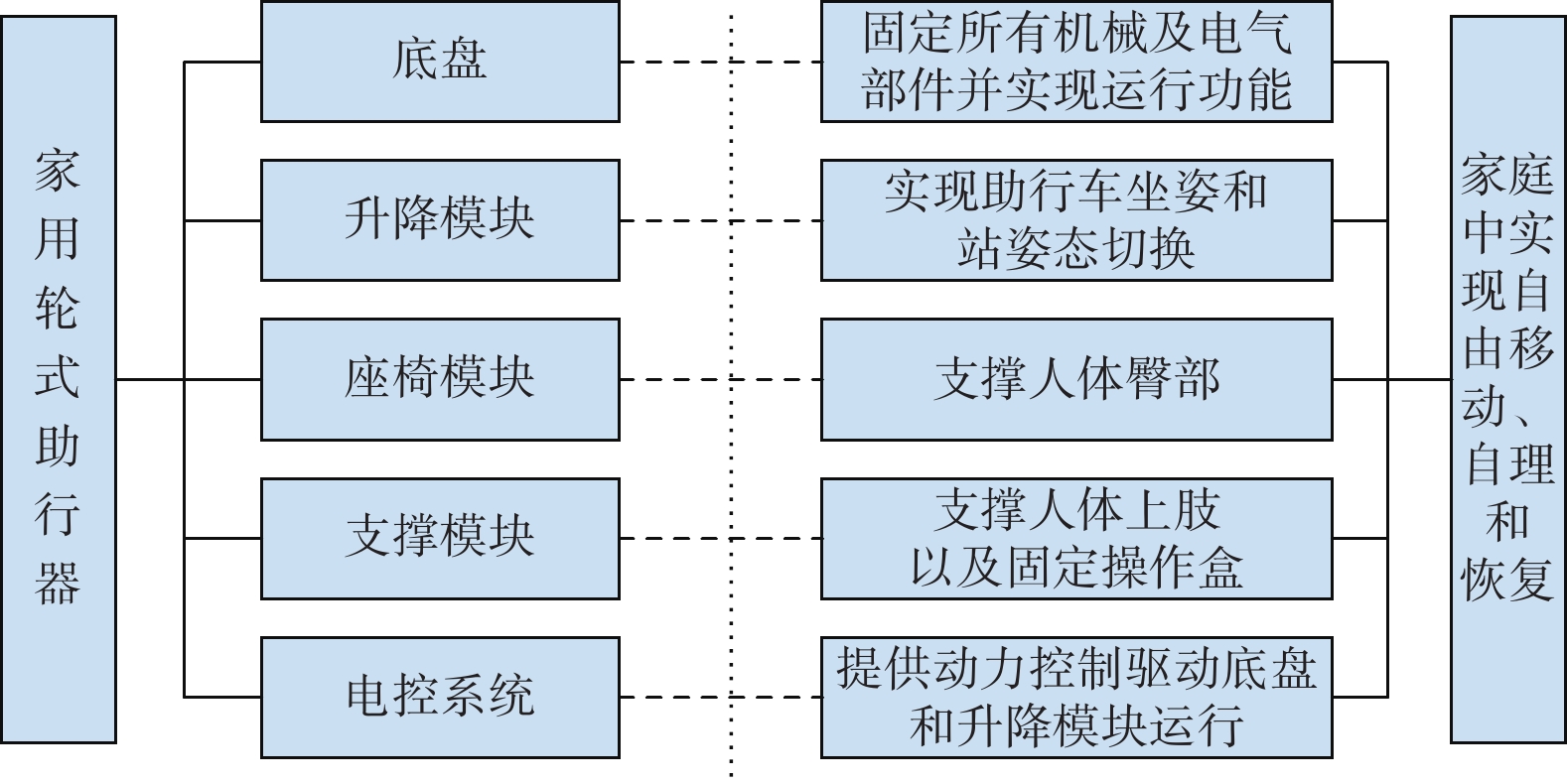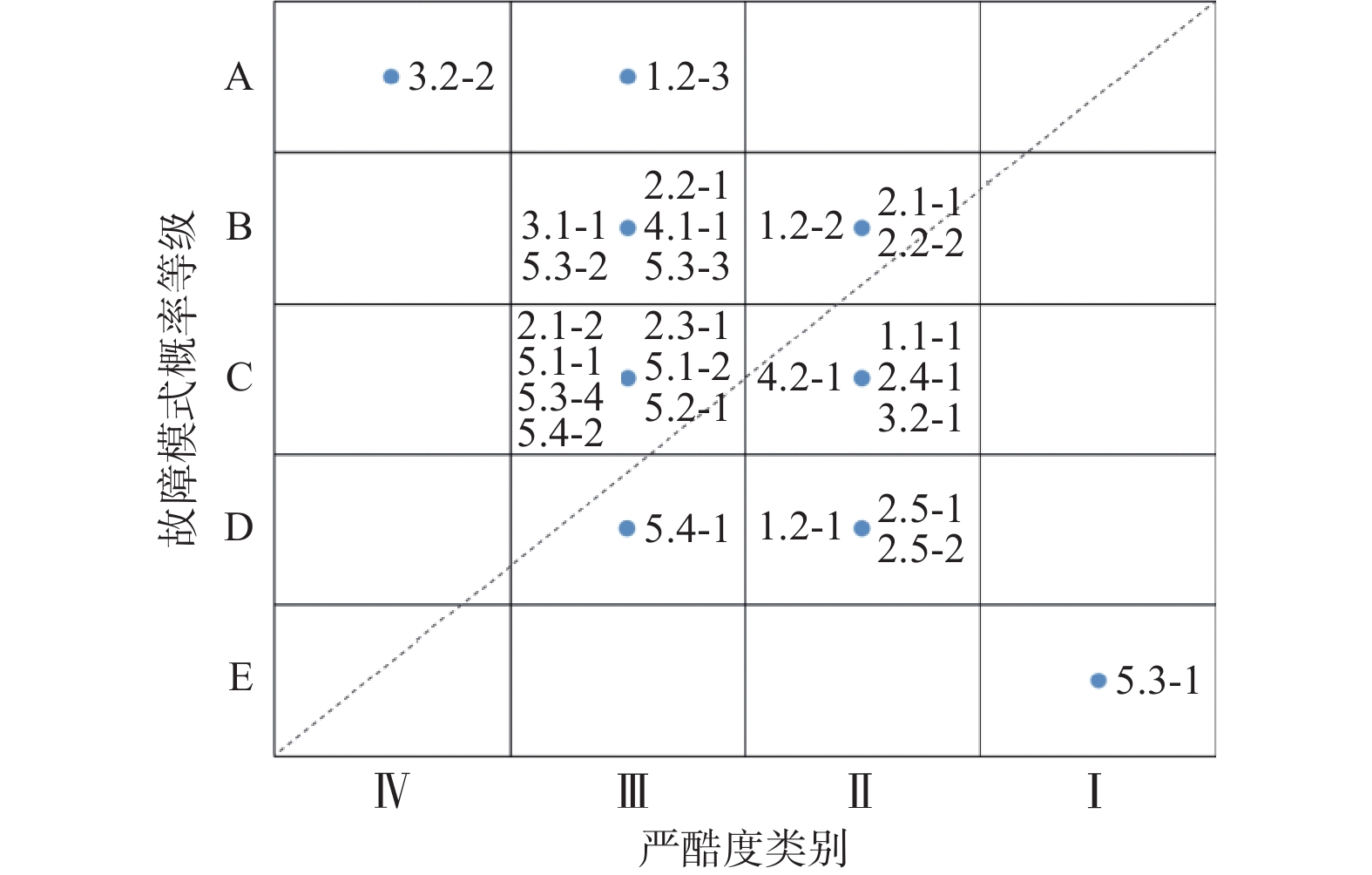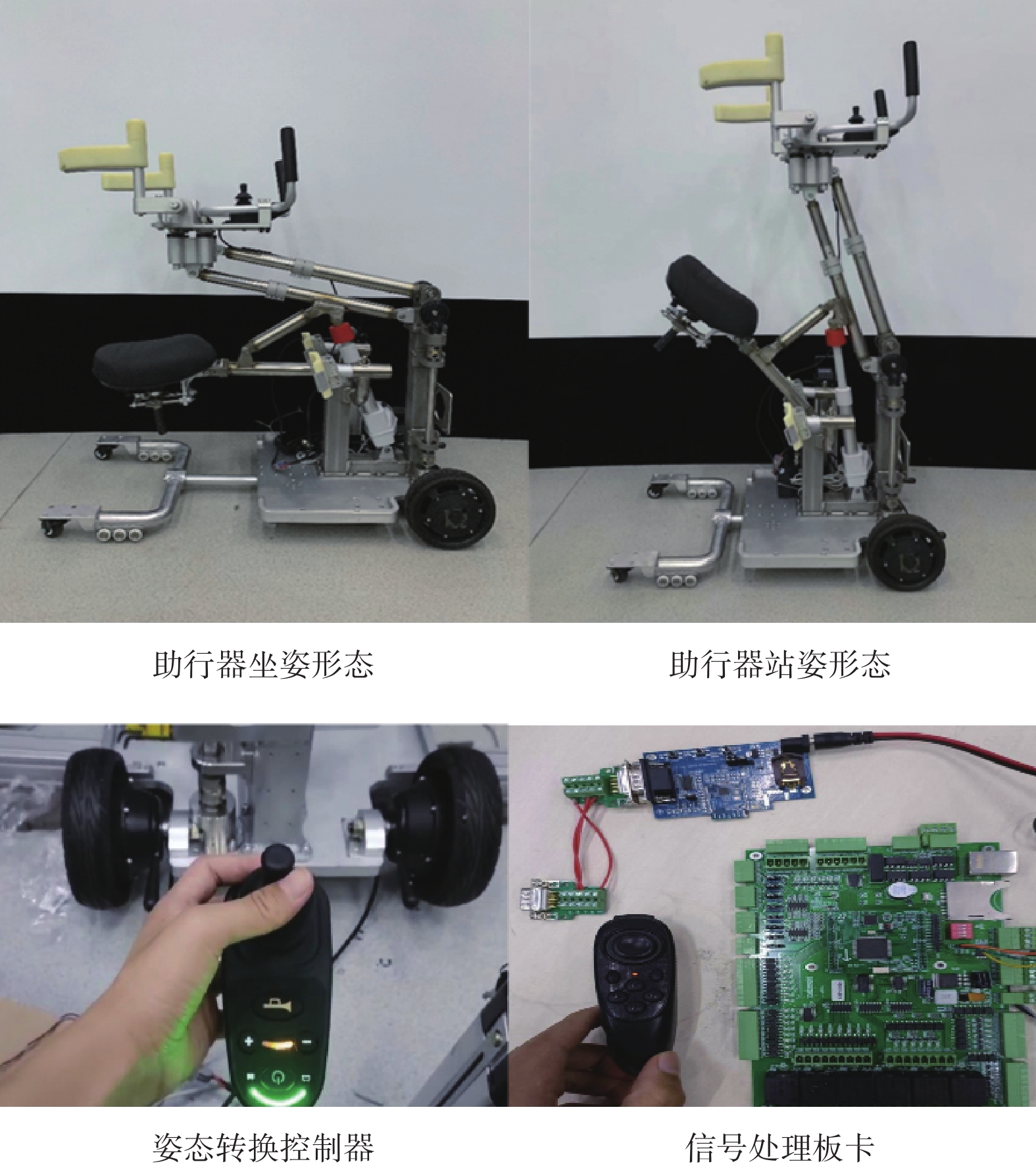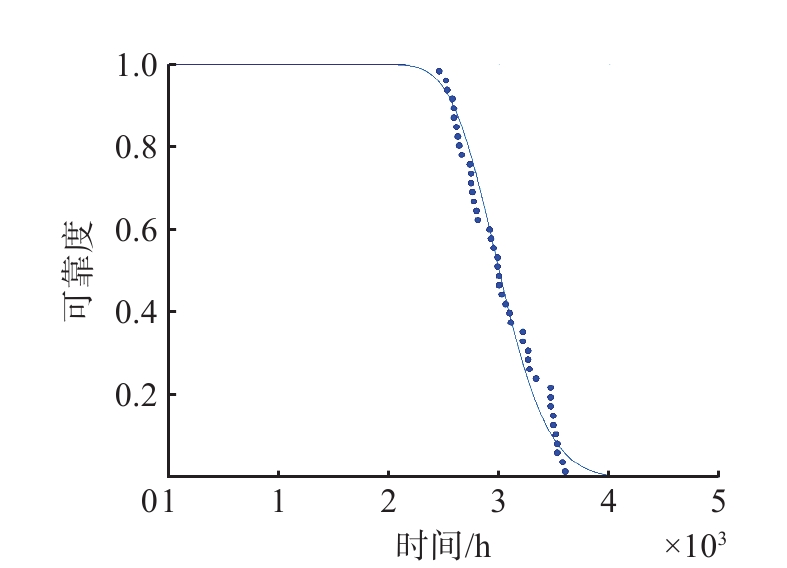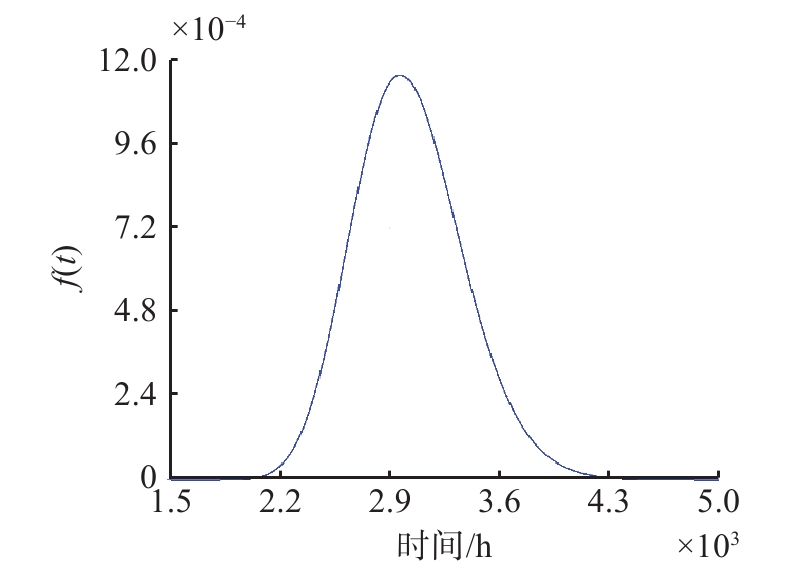FMECA and Failure Data Analysis of Domestic Wheeled Walking-Aid
-
摘要:
中国人口老龄化速度的逐渐加快导致对助行器的需求加大。可靠性是助行器的重要属性之一,然而目前助行器的可靠性研究较少。该文以家用轮式助行器为例,对其展开故障模式、影响及其危害性分析。通过收集、整理和分析26种故障模式,得到影响其可靠性关键模块为坐姿-站姿转换系统。针对此关键模块,该文开展了故障数据的采集及分析,检验其寿命分布符合对数正态分布模型,该模块可靠寿命t0.9的0.95置信下限为2489.4 h。该研究针对家用轮式助行器开展的可靠性分析可以为其他有源医疗设备的可靠性分析提供思路,并推动形成符合我国医疗器械监管法规要求的可靠性研究审评要点,供业界参考。
-
关键词:
- 助行器 /
- 可靠性 /
- 故障模式、影响及其危害性分析 /
- 失效数据分析
Abstract:The gradual acceleration of the aging population in China has led to an increased demand for mobility aids, and the reliability of domestic wheeled walking-aid is one of their important attributes, but there is little research on the reliability of mobility aids. This paper conducts the failure mode, effects and criticality analysis on domestic wheeled walking-aid. By collecting, collating and analyzing the 26 failure modes, the key modules are the chassis and the lifting system. The key modules are obtained, and the failure data is analyzed to find out that the lifetime distribution model is log-normal and the 0.95 lower confidence limit for reliability life of product t0.9 is 2489.4 hours. The study aims to provide ideas for the reliability analysis of other active medical devices and calls for the formation of a reliability study review point for the industry that meets the requirements of Chinese medical device regulations.
-
0. 引言
随着人口老龄化速度加快,未来老年人将成为我国人群结构中的主力军[1]。身体机能退化会导致行动障碍会降低老年人的生活品质,同时加重家庭负担。随着科技进步,家用助行器得到了广泛地运用,其可以帮助老年人在室内以及室外等场景展开复健活动。由于助行器的使用者多为行动不便的老年人或残障人士,一旦部件失效引发不良事件,会对使用者造成严重的后果。所以,助行器可靠性的重要程度不言而喻,而目前我国医疗器械行业对助行器的可靠性研究十分有限。
在可靠性技术领域,故障模式、影响及其危害性分析(failure mode, effects and criticality analysis, FMECA)以产品为对象,分析其潜在故障模式、故障原因,并对故障严酷度进行评估,从而为产品改进提供建议,是一项较为成熟且得到了广泛应用的可靠性分析方法[2-3]。在FMECA的基础上,可以分析出影响产品可靠性关键部件,特别是一些有耗损型失效机理存在的风险部件,在产品设计中应该对这些关键部件开展相应的试验和数据分析,以探索其失效分布,从而判断这些关键部件的耗损型失效最终对整机产品可靠性水平的影响[4-6]。下面以家用轮式助行器为例,先开展整机FMECA,再对坐姿-站姿转换系统进行试验和数据分析,研究其失效分布和寿命指标。
1. 家用轮式助行器结构及功能
家用轮式助行器用于行动障碍患者的辅助行走或站立,其主要由支撑模块、电控系统、升降模块、座椅模块和底盘这5大系统组成,家用轮式助行器结构如图1所示。
用户通过操作电控系统内的摇杆,给助行器传递开关机、移动、升降等动作,而电控系统接收到信号后,将指令传达至升降模块、底盘或座椅模块,完成指定的动作。根据家用轮式助行器的组成结构和主要功能,可以建立结构层次与功能对应,如图2所示。
2. 家用轮式助行器FMECA
2.1 划分约定层次
根据家用轮式助行器的结构和功能分解,划分层次如下:
(1)初始约定层次:家用轮式助行器。
(2)第二约定层次:底盘、升降模块、座椅模块、支撑模块、电控系统。
(3)最低约定层次:机架、万向轮;外壳结构、轮毂电机、电动推杆、运动部件、链条;坐垫;扶手、绑带;操纵摇杆、导航模块、电源、导线、电路板。
2.2 严酷度及概率发生等级
根据家用轮式助行器的每个功能故障模式对系统的最终影响程度确定其类别,故障模式严酷度类别及定义如表1所示。
表 1 故障模式严酷度类别及定义Table 1. Failure mode severity categories and definitions类别 严酷度 定义 Ⅰ 灾难的 引起家用轮式助行器的主要或关键功能全部丧失,或对环境、人员造成危害 Ⅱ 致命的 引起家用轮式助行器主要或部分关键功能丧失,或造成被监控、测量、调节系统设备的损坏 Ⅲ 严重的 引起家用轮式助行器部分关键性能降低,影响其主要功能的执行 Ⅳ 轻度的 引起家用轮式助行器轻度损坏,但不影响主要功能的执行,可能导致非计划性的维护或修理 根据家用轮式助行器不同故障模式的发生概率,将其定性地归纳为不同概率等级,故障模式发生概率约定表(定性)如表2所示。
表 2 故障模式发生概率约定表(定性)Table 2. Occurrence probability table of failure mode (qualitative)等级 发生概率 发生概率描述 A 经常发生 高概率 B 有时发生 中等概率 C 偶然发生 不常发生 D 很少发生 不大可能发生 E 极少发生 近乎为零 2.3 FMECA实施
根据家用轮式助行器的结构,按照约定层次,确定所有可能的故障模式、故障发生的原因和产生的影响,分析确定每一个故障模式的严酷度和发生概率等级。第二约定层次的家用轮式助行器FMECA分析如表3所示。
表 3 家用轮式助行器FMECATable 3. FMECA of domestic wheeled walking-aid模块名称 部件名称 功能描述 故障模式编码 故障模式 故障原因及
机理故障影响 严酷度 故障概率等级 局部影响 高一层影响 最终
影响底盘 机架 支撑整体
设备1.1-1 结构损坏 撞击磨损 表面损坏 底盘结构
损坏影响整车运行 Ⅱ C 万向轮 地面移动
功能1.2-1 轮子掉落 装配不当 车子无法运行 用户失衡 影响用户安全 Ⅱ D 1.2-2 不能正常启动
或制动程序故障 不能启动或停
不下来用户失衡 影响用户安全 Ⅱ B 1.2-3 运行卡顿 内部算法程序错误 运行不顺畅 运行不
顺畅影响整车运行 Ⅲ A 升降模块 机械结构 支撑作用 2.1-1 机械结构损坏 磨损或撞击 无法提供支撑 用户失衡 影响用户安全 Ⅱ B 2.1-2 机械结构松动 安装不当 支撑部件晃动 影响升降
性能影响设备功能 Ⅲ C 电动推杆 升降用户 2.2-1 电动推杆噪声
过大选型不当 噪声过大 噪声过大 影响设备功能 Ⅲ B 2.2-2 电动推杆损坏 磨损或撞击 无法升降用户 用户失衡 影响用户安全 Ⅱ B 链条 传递驱动力 2.3-1 链条损坏或从
卡槽掉出链条装配不当 链条脱出 无法调整
底盘影响设备功能 Ⅲ C 运动控制部件 控制推杆
升降2.4-1 控制部件指令
错误内部控制程序错误 部件卡滞 升降功能
失效影响用户安全 Ⅱ C 轮毂电机 提供驱动力 2.5-1 电机停止运作 电机内部卡滞、短路断路 无法提供驱动力 升降功能
失效影响用户安全 Ⅱ D 2.5-2 电机烧毁 电机过载或环境过热 无法提供驱动力 升降功能
失效影响用户安全 Ⅱ D 座椅模块 机械结构 支撑作用 3.1-1 机械结构损坏 磨损或撞击 表面损坏 座椅结构
损坏影响设备功能 Ⅲ B 坐垫 用户移动时
的座位3.2-1 坐垫折叠功能
失效装配不当 座椅无法翻折 无法支撑
用户影响用户安全 Ⅱ C 3.2-2 坐垫海绵破损 物理划伤 表面损坏 表面损坏 表面
损坏Ⅳ A 支撑模块 机械结构 支撑作用 4.1-1 机械结构损坏 磨损或撞击 表面损坏 座椅结构
损坏影响设备功能 Ⅲ B 绑带 固定用户 4.2-1 绑带断裂 绑带材质不佳 绑带损坏 影响用户
安全影响用户安全 Ⅱ C 电控系统 摇杆 手动控制产
品操作5.1-1 摇杆操作失效 设备接线错误 摇杆无法操作或
指令不正确电控系统控制指令错误 影响设备功能 Ⅲ C 5.1-2 摇杆操作不灵敏 设备接线短路 摇杆操作滞后 电控系统控制指令滞后 影响设备功能 Ⅲ C 导航模块 产品移动导
航功能5.2-1 导航功能失效 模块无法正常收发信号 无影响 电控系统导航功能错误 影响设备功能 Ⅲ C 电池 提供电源 5.3-1 电池起火 温度过高,电芯过充电或发生短路 电池起火 电控系统
烧坏整车损坏,产生安全问题 Ⅰ E 5.3-2 电池容量降低 电池过充或内部短路 影响电池寿命 影响设备运行时间 影响设备功能 Ⅲ B 5.3-3 电池发热严重 外部应力或负载过大 影响电池寿命 影响设备运行时间 影响设备功能 Ⅲ B 5.3-4 充放电不稳定 温度过高或电池散热差 电池充放电
不稳定设备控制不稳定 影响设备功能 Ⅲ C 移动端(手机/电脑)软件遥控 远程控制产
品操作5.4-1 移动端软件遥控失灵 移动端软件功能故障 无法遥控或遥控
指令不正确电控系统遥控功能失效 影响设备功能 Ⅲ D 5.4-2 移动端软件无法连接设备 蓝牙模块故障 移动端无法连接
设备电控系统遥控功能失效 影响设备功能 Ⅲ C 通过FMECA,可以得出26种故障模式,其中,Ⅰ类故障模式1种,Ⅱ类故障模式10种,Ⅲ类故障模式14种,Ⅳ类故障模式1种。根据分析结果,可以统计出产品危害性矩阵,如图3所示。
2.4 FMECA分析结论
根据家用轮式助行器FMECA结果可知,该家用轮式助行器主要功能是承载用户进行移动且能实现对用户的姿势改变,这意味着与用户身体直接接触的部件发生故障,可能对用户安全产生影响,因此需重点关注Ⅰ、Ⅱ类故障模式。
由图3可知,Ⅰ、Ⅱ类故障模式主要来自底盘和升降模块,而发生概率最高的故障模式为1.2-2、2.1-1和2.2-2,即底盘模块万向轮不能启动或制动,以及升降模块中发生机械结构损坏和电动推杆损坏这3种故障。而这3种故障主要发生在设备完成坐姿-站姿转换任务时,该任务需要底盘和升降模块同时完成伸缩和转换的工作。如果在任务执行中发生故障,会导致用户失衡,最终影响用户安全。
因此需要针对设备的坐姿-站姿转换系统开展故障数据收集和分析工作,以寿命分布模型表征其故障时间特性。
3. 家用轮式助行器关键系统故障数据采集及分析
3.1 系统故障数据采集方案
采用实验室寿命试验的方法获取故障数据,受试系统试验环境条件与实际使用中的典型工作环境及状态相同(温度为(20±10) ℃,相对湿度为60%±35%,电压为(24±0.5) V),即未施加额外加速应力。试验的对象为坐姿-站姿转换系统执行机构。由于该系统与用户身体直接接触,其故障会直接对用户安全产生影响。出于安全考虑,对该批次生产的全部样品采用无替换的完全寿命试验,规定样品全部失效时停止试验。助行器坐姿-站姿姿态变化及其控制系统如图4所示,设备初始状态为坐姿状态,升降模块推杆收到最短,底盘伸展到最长。启动电源,按“+”号键推杆伸出,底盘收回,系统由坐姿最低状态逐步抬升到站姿最高状态,再按“-”号键推杆收回,底盘伸出,系统由站姿最高状态逐步下降到坐姿最低状态,至此完成一次试验循环。重复以上动作,直至出现坐姿-站姿转换功能失效、推杆堵转、齿轮跳齿等现象则视为故障,并记录正常工作的时长。
3.2 系统故障数据分析
对试验过程的故障时间进行收集,可以得到表4所列系统失效数据。数据表明,该系统故障时间集中在2000~3000 h。据此可以对该系统寿命分布模型进行拟合,首先选取1P-Exponential分布、2P-Exponential分布、正态分布、对数正态分布、2P-Weibull分布、Logistic分布进行拟合。系统可靠度函数图如表5所示。
表 4 坐姿-站姿转换系统故障数据Table 4. Failure data of sitting-standing conversion system序
号故障时间/h 序
号故障时间/h 序
号故障时间/h 序
号故障时间/h 1 3024 12 3516 23 2532 34 3216 2 3468 13 3 108 24 3576 35 2 592 3 2748 14 2736 25 3600 36 2916 4 2592 15 3060 26 2988 37 3264 5 3216 16 2988 27 2616 38 2952 6 3096 17 3000 28 3276 39 2748 7 3468 18 2796 29 3000 40 3528 8 3492 19 2460 30 3492 41 2 520 9 3468 20 2772 31 2580 42 3264 10 2628 21 2928 32 2640 43 2760 11 2664 22 3336 33 2808 44 3528 根据拟合的结果进行优选,排序第一的是对数正态分布,因此选择对数正态分布为最优寿命分布模型。为了求得对数正态分布的参数μ和σ2,采用MLE方法进行参数估计,即:
$$ \hat \mu = \frac{1}{n}\sum\limits_{i = 1}^n {\ln {t_i}} $$ (1) $$ {\hat \sigma ^2} = \frac{1}{n}{\sum\limits_{i = 1}^n {\left( {\ln {t_i} - \mathop {\hat \mu }\limits^{} } \right)} ^2} $$ (2) 表 5 坐姿-站姿转换系统寿命分布模型拟合结果Table 5. Life distribution model fitting results of sitting-standing conversion system分布 AVGOF AVPLOT LKV 拟合匹配
度排序1P-Exponential 100.0000 23.0852 −396.5990 6 2P-Exponential 79.3605 8.2543 −322.5718 5 正态 44.3257 4.4630 −319.6551 2 对数正态 38.5310 3.9713 −319.3418 1 2P-Weibull 47.6495 5.1577 −320.7770 4 Logistic 41.9832 4.3173 −321.7363 3 根据MLE方法估计的参数,可知该系统的失效概率密度函数f(t)、不可靠度F(t)和可靠度R(t):
$$ f\left( t \right) = \frac{1}{{{\text{0}}{\text{.115\,685}}t\sqrt {2{\text{π }}} }}{{\text{e}}^{ - \tfrac{1}{2}{{\left( {\tfrac{{\ln t - 8.007\,074}}{{{\text{0}}{\text{.115\,685}}}}} \right)}^2}}} $$ (3) $$ F(t) = \Phi \left( {\frac{{\ln t - 8.007\,074}}{{0.115\,685}}} \right) $$ (4) $$ R(t) = 1 - F(t) $$ (5) 根据求解所得函数,可以作系统可靠度函数(见图5)和系统失效率密度函数(见图6)。
由失效概率密度函数图可知,该系统分布曲线为对数正态分布,其概率分布比正态分布向右发生了移动,因此其失效时间有更大向上波动的可能。同时根据该图可以求解该系统置信水平γ=0.95,可靠度R=0.9时,其可靠寿命的置信下限为:
$$ {t}_{\text{RL}\text{,}\text{γ}}=2\,489.4\;{\rm{h}} $$ 4. 总结与讨论
本研究对家用轮式助行器展开了FMECA,并在此基础上展开了故障数据的采集和分析。结果表明,家用轮式助行器共26种故障模式,其关键模块为底盘和升降模块,其故障容易导致整车停止运行且有可能危害用户安全。因此,针对其坐姿-站姿转换系统展开了故障数据收集,建立了寿命分布模型,结果表明本系统寿命分布模型符合对数正态分布。
通过分析其失效概率密度函数图可知,本系统的置信水平为0.95时,可靠寿命t0.9的置信下限为2489.4 h。假设用户每天使用助行器的时间最多为12 h,则坐姿-站姿转换系统的使用期限至少为209 d(置信水平0.95)。
本研究对家用轮式助行器进行可靠性分析,以期为其他有源医疗设备的可靠性分析提供思路。家用轮式助行器结构相对简单,约定层次较少,临床应用场景较为单一,考虑的故障分析环境单一。对于大型影像设备等结构较复杂的产品要划分更多层级的约定层次,对于急救转运呼吸机等临床应用场景较为复杂的产品,要结合不同使用环境条件进行考虑。
医疗器械的可靠性是实现其安全有效的重要前提和保障。因此,可靠性研究应贯穿产品的设计、生产、测试、包装、运输、储存、使用、维护保养的全生命周期,并通过风险分析动态开展产品的可靠性研究[7]。我国相关医疗器械法规对产品使用期限有明确规定[8-9],同时要求生产企业在注册申报时,提交产品可靠性相关的研究资料,即证明在生产企业规定的使用期限/使用次数内,在正常使用、维护和校准情况下,产品的性能、功能满足使用要求[10]。但目前我国有源医疗器械的可靠性研究缺少系统化的评价方法,亟待形成可靠性研究审评要点供业界参考。
-
表 1 故障模式严酷度类别及定义
Table 1 Failure mode severity categories and definitions
类别 严酷度 定义 Ⅰ 灾难的 引起家用轮式助行器的主要或关键功能全部丧失,或对环境、人员造成危害 Ⅱ 致命的 引起家用轮式助行器主要或部分关键功能丧失,或造成被监控、测量、调节系统设备的损坏 Ⅲ 严重的 引起家用轮式助行器部分关键性能降低,影响其主要功能的执行 Ⅳ 轻度的 引起家用轮式助行器轻度损坏,但不影响主要功能的执行,可能导致非计划性的维护或修理 表 2 故障模式发生概率约定表(定性)
Table 2 Occurrence probability table of failure mode (qualitative)
等级 发生概率 发生概率描述 A 经常发生 高概率 B 有时发生 中等概率 C 偶然发生 不常发生 D 很少发生 不大可能发生 E 极少发生 近乎为零 表 3 家用轮式助行器FMECA
Table 3 FMECA of domestic wheeled walking-aid
模块名称 部件名称 功能描述 故障模式编码 故障模式 故障原因及
机理故障影响 严酷度 故障概率等级 局部影响 高一层影响 最终
影响底盘 机架 支撑整体
设备1.1-1 结构损坏 撞击磨损 表面损坏 底盘结构
损坏影响整车运行 Ⅱ C 万向轮 地面移动
功能1.2-1 轮子掉落 装配不当 车子无法运行 用户失衡 影响用户安全 Ⅱ D 1.2-2 不能正常启动
或制动程序故障 不能启动或停
不下来用户失衡 影响用户安全 Ⅱ B 1.2-3 运行卡顿 内部算法程序错误 运行不顺畅 运行不
顺畅影响整车运行 Ⅲ A 升降模块 机械结构 支撑作用 2.1-1 机械结构损坏 磨损或撞击 无法提供支撑 用户失衡 影响用户安全 Ⅱ B 2.1-2 机械结构松动 安装不当 支撑部件晃动 影响升降
性能影响设备功能 Ⅲ C 电动推杆 升降用户 2.2-1 电动推杆噪声
过大选型不当 噪声过大 噪声过大 影响设备功能 Ⅲ B 2.2-2 电动推杆损坏 磨损或撞击 无法升降用户 用户失衡 影响用户安全 Ⅱ B 链条 传递驱动力 2.3-1 链条损坏或从
卡槽掉出链条装配不当 链条脱出 无法调整
底盘影响设备功能 Ⅲ C 运动控制部件 控制推杆
升降2.4-1 控制部件指令
错误内部控制程序错误 部件卡滞 升降功能
失效影响用户安全 Ⅱ C 轮毂电机 提供驱动力 2.5-1 电机停止运作 电机内部卡滞、短路断路 无法提供驱动力 升降功能
失效影响用户安全 Ⅱ D 2.5-2 电机烧毁 电机过载或环境过热 无法提供驱动力 升降功能
失效影响用户安全 Ⅱ D 座椅模块 机械结构 支撑作用 3.1-1 机械结构损坏 磨损或撞击 表面损坏 座椅结构
损坏影响设备功能 Ⅲ B 坐垫 用户移动时
的座位3.2-1 坐垫折叠功能
失效装配不当 座椅无法翻折 无法支撑
用户影响用户安全 Ⅱ C 3.2-2 坐垫海绵破损 物理划伤 表面损坏 表面损坏 表面
损坏Ⅳ A 支撑模块 机械结构 支撑作用 4.1-1 机械结构损坏 磨损或撞击 表面损坏 座椅结构
损坏影响设备功能 Ⅲ B 绑带 固定用户 4.2-1 绑带断裂 绑带材质不佳 绑带损坏 影响用户
安全影响用户安全 Ⅱ C 电控系统 摇杆 手动控制产
品操作5.1-1 摇杆操作失效 设备接线错误 摇杆无法操作或
指令不正确电控系统控制指令错误 影响设备功能 Ⅲ C 5.1-2 摇杆操作不灵敏 设备接线短路 摇杆操作滞后 电控系统控制指令滞后 影响设备功能 Ⅲ C 导航模块 产品移动导
航功能5.2-1 导航功能失效 模块无法正常收发信号 无影响 电控系统导航功能错误 影响设备功能 Ⅲ C 电池 提供电源 5.3-1 电池起火 温度过高,电芯过充电或发生短路 电池起火 电控系统
烧坏整车损坏,产生安全问题 Ⅰ E 5.3-2 电池容量降低 电池过充或内部短路 影响电池寿命 影响设备运行时间 影响设备功能 Ⅲ B 5.3-3 电池发热严重 外部应力或负载过大 影响电池寿命 影响设备运行时间 影响设备功能 Ⅲ B 5.3-4 充放电不稳定 温度过高或电池散热差 电池充放电
不稳定设备控制不稳定 影响设备功能 Ⅲ C 移动端(手机/电脑)软件遥控 远程控制产
品操作5.4-1 移动端软件遥控失灵 移动端软件功能故障 无法遥控或遥控
指令不正确电控系统遥控功能失效 影响设备功能 Ⅲ D 5.4-2 移动端软件无法连接设备 蓝牙模块故障 移动端无法连接
设备电控系统遥控功能失效 影响设备功能 Ⅲ C 表 4 坐姿-站姿转换系统故障数据
Table 4 Failure data of sitting-standing conversion system
序
号故障时间/h 序
号故障时间/h 序
号故障时间/h 序
号故障时间/h 1 3024 12 3516 23 2532 34 3216 2 3468 13 3 108 24 3576 35 2 592 3 2748 14 2736 25 3600 36 2916 4 2592 15 3060 26 2988 37 3264 5 3216 16 2988 27 2616 38 2952 6 3096 17 3000 28 3276 39 2748 7 3468 18 2796 29 3000 40 3528 8 3492 19 2460 30 3492 41 2 520 9 3468 20 2772 31 2580 42 3264 10 2628 21 2928 32 2640 43 2760 11 2664 22 3336 33 2808 44 3528 表 5 坐姿-站姿转换系统寿命分布模型拟合结果
Table 5 Life distribution model fitting results of sitting-standing conversion system
分布 AVGOF AVPLOT LKV 拟合匹配
度排序1P-Exponential 100.0000 23.0852 −396.5990 6 2P-Exponential 79.3605 8.2543 −322.5718 5 正态 44.3257 4.4630 −319.6551 2 对数正态 38.5310 3.9713 −319.3418 1 2P-Weibull 47.6495 5.1577 −320.7770 4 Logistic 41.9832 4.3173 −321.7363 3 -
[1] 中华人民共和国民政部. 2016 年社会服务发展统计公告[OL]. (2017-08-03)[2023-07-08]. https://www.gov.cn/xinwen/2017-08/03/content_5215805.htm. [2] 李亚球, 朱嘉伟, 孙强, 等. 基于FMEA的密封氘氚中子管可靠性分析[J]. 核技术, 2018, 41(11): 26-32. [3] 王凯, 崔寓淏, 刘胜. 基于FMECA的ZQJ-291H型氦质谱检漏仪可靠性分析[J]. 真空, 2019, 56(3): 48-51. [4] 王东升, 贾志新, 毕温海, 等. 基于FMEA的折弯机器人动力与传动系统可靠性分析[J]. 制造技术与机床, 2019(3): 13-16. [5] 杨波, 殷鸿浩, 何玉敏, 等. 基于FMEA的汽车密封条产品生产过程质量改进实践[J]. 质量与可靠性, 2019(2): 39-42. [6] 尤建新, 郭仁祝, 杨迷影. 基于失效模式与后果分析的混合燃料发动机风险分析[J]. 同济大学学报(自然科学版), 2019, 47(5): 731-738. [7] 朱嘉伟, 杨雪鹤, 郑晨, 等. 中国有源医疗器械行业可靠性及其审评现状研究[J]. 生物医学工程学杂志, 2022, 39(5): 9. [8] 中华人民共和国国务院. 中华人民共和国国务院令第739号 医疗器械监督管理条例[EB/OL]. (2021-02-09)[2023-07-08]. https://www.nmpa.gov.cn/xxgk/fgwj/flxzhfg/20210319202057136.html. [9] 国家食品药品监督管理总局. 2014年第6号医疗器械说明书和标签管理规定[EB/OL]. (2014-07-30)[2023-07-08]. https://www.nmpa.gov.cn/ylqx/ylqxfgwj/ylqxbmgzh/20140730180001248.html. [10] 国家药品监督管理局. 关于公布医疗器械注册申报资料要求和批准证明文件格式的公告(2021年第121号)[EB/OL]. (2021-09-30)[2023-07-08]. https://www.nmpa.gov.cn/ylqx/ylqxggtg/20210930155134148.html. -
期刊类型引用(1)
1. 林登焕. 基于血液透析设备的故障模式、影响和危害性分析(FMECA)及相关失效数据分析. 中国医疗器械信息. 2024(23): 169-172 .  百度学术
百度学术
其他类型引用(0)



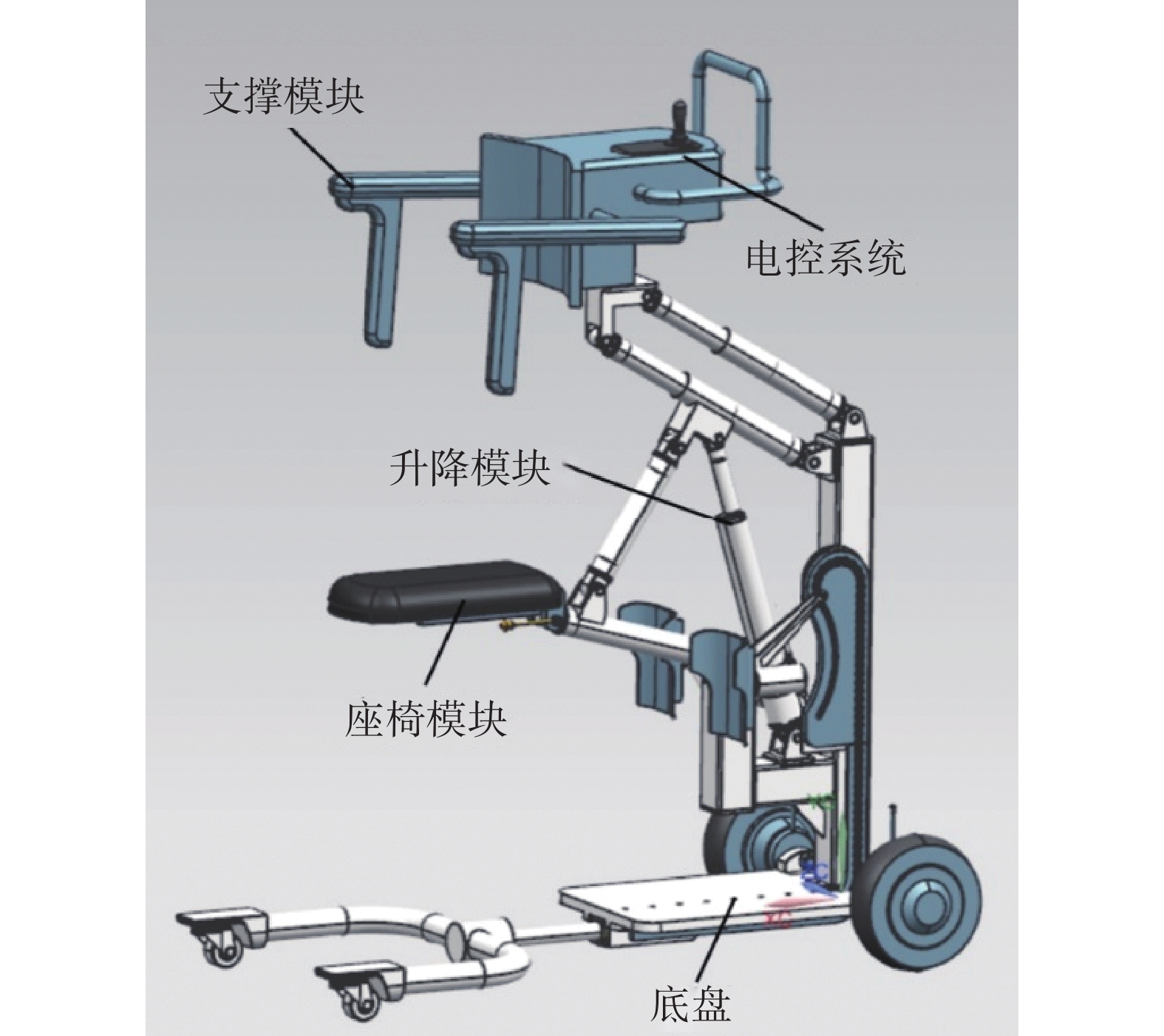
 下载:
下载:
